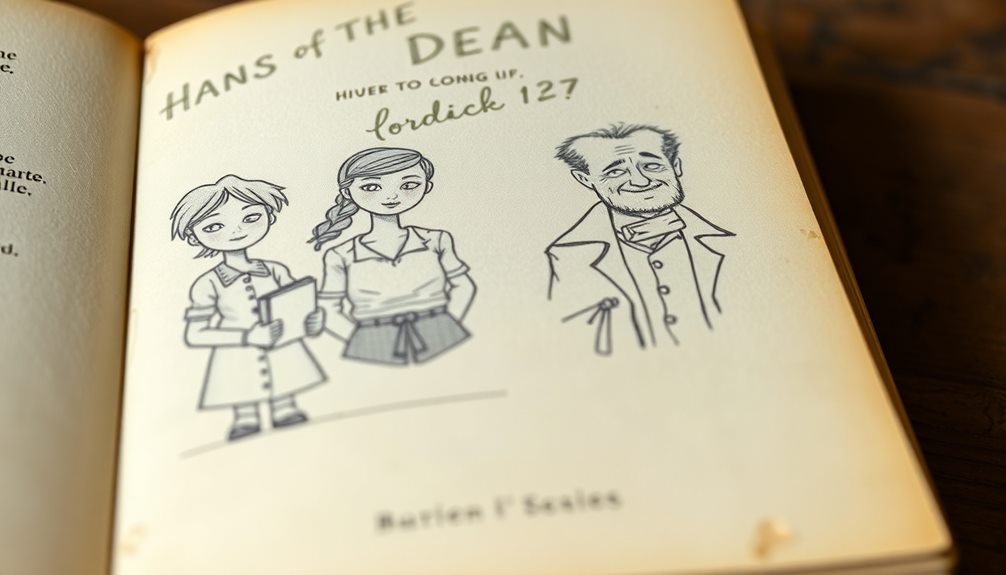Absolutely, 'The Book Thief' is worth your time. You'll be drawn into Liesel's journey through Nazi Germany, beautifully narrated by Death. The unique perspective adds depth to the story, making you reflect on humanity and loss. You'll feel a whirlwind of emotions as its rich imagery captures both despair and hope. The characters, like Liesel and her compassionate foster parents, showcase extraordinary resilience in dark times. Despite its heavy themes, the profound impact and cultural significance make it an essential read. Keep exploring, and you'll discover even more about why this book resonates with so many.
Overview of the Novel
In "The Book Thief," Markus Zusak crafts a poignant tale set against the harrowing backdrop of Nazi Germany during World War II. You follow the journey of Liesel Meminger, a young girl who discovers the transformative power of words while maneuvering through an oppressive world.
As Liesel grapples with loss and hardship, her passion for reading becomes her refuge, symbolizing hope and resistance. The novel vividly illustrates the immense challenges faced by characters on Himmel Street under Nazi rule, making their acts of courage resonate deeply in a climate of fear.
As you explore Liesel's journey, you witness the profound effects of resilience amid adversity, showcasing how hope can emerge in the darkest times.
The novel explores deep themes, such as friendship and the impact of war on individuals and families. Through the lens of Liesel's experiences, you gain insight into the everyday struggles of those living under the Nazi regime.
Zusak's unique narrative technique, with Death as the storyteller, adds an intriguing layer that encourages you to reflect on mortality and the human condition.
As Liesel steals books to nurture her love for literature, you witness the profound effect words can have on the human spirit. "The Book Thief" not only captivates you with its rich storytelling but also emphasizes the importance of language in overcoming adversity.
With over sixteen million copies sold and a film adaptation, this novel's impact on literature and culture is undeniable.
Unique Narrative Perspective
In "The Book Thief," you experience a story like no other, narrated by Death himself. This choice not only gives you an omniscient view of the characters' lives but also shapes the emotional weight through non-linear storytelling.
As you journey through Liesel's world, you encounter profound themes of memory, regret, and self-reflection, which deepen your understanding of the narrative.
Death's unique perspective adds layers of humor and wisdom, making the narrative resonate deeply.
Death as Narrator
Death's unique perspective in *The Book Thief* transforms the narrative into a profound exploration of humanity during one of history's darkest times. As the narrator, Death blends humor and sensitivity, which allows you to engage with the story on a deeper level.
You'll find that this unconventional choice adds layers of complexity to the themes of love, loss, and resilience. With his omniscient view, Death comments on the inevitability of mortality and the fragility of life, reminding you that every moment counts.
His insights prompt you to reflect on the human experience, as he guides you through the lives affected by World War II. This portrayal of death isn't grim; instead, it encourages you to appreciate the beauty in fleeting moments.
Death's narration also enhances the storytelling through creative techniques like foreshadowing, subtly hinting at the fates awaiting characters. This unique perspective not only keeps you captivated but also challenges you to think critically about the impact of war on humanity.
Ultimately, you'll find that Death's voice enriches the narrative, making *The Book Thief* a powerful read that resonates long after you've turned the last page.
Non-linear Storytelling Techniques
Non-linear storytelling techniques play an essential role in *The Book Thief*, creating a rich tapestry of events that reflect the chaos of war. With Death as the narrator, you experience an omniscient perspective that deepens the narrative's complexity. This non-linear storytelling allows you to encounter events out of chronological order, enhancing emotional engagement and providing a unique lens through which to view Liesel's journey.
Death's frequent interruptions and bold statements keep you on your toes, prompting reflection on the themes and characters. The stories-within-stories format adds another layer of intricacy, as Liesel's life intertwines with those around her, illustrating their interconnectedness during WWII. Each character's struggle resonates within the broader narrative, creating a sense of community amidst turmoil.
Through vivid imagery and metaphorical language, the storytelling immerses you in the emotional landscape of the characters' experiences, ensuring that each moment is impactful. This approach not only reflects the unpredictability of war but also invites you to engage deeply with the text, making it a memorable reading experience.
Emotional Resonance and Depth
Maneuvering through the pages of *The Book Thief*, you encounter a profound emotional landscape shaped by its unique narrative perspective. Narrated by Death, the story brings a remarkable blend of emotional insight and detachment, offering you a fresh lens through which to view the characters' struggles.
Death's character adds a layer of complexity, using humor and sensitivity to discuss themes of loss and the value of human connections.
The vivid imagery and metaphorical language compel you to feel the weight of each character's journey. You're drawn into Liesel's world, where the power of words becomes a beacon of hope amidst despair. This exploration of language and its impact on relationships prompts deep reflection on moral questions surrounding life and death.
Non-linear storytelling mirrors the chaos of war, enhancing the emotional resonance you experience. The creative techniques, like stories-within-stories, guarantee that the impact lingers long after you've turned the last page.
Ultimately, *The Book Thief* invites you to contemplate the fragility of life and the strength found in love and words, making it a deeply moving read that stays with you.
Character Analysis

Character analysis in "The Book Thief" reveals a rich tapestry of relationships that shape the protagonist, Liesel Meminger, and those around her. As you explore these characters, you'll see how their connections impact Liesel's growth and resilience amid adversity. This mirrors the courage and determination found in stories of women overcoming challenges in "Unbreakable Non-Fiction Tales of Survival and Hope."
- Liesel Meminger evolves from a traumatized girl into a strong individual, finding solace in words and literature.
- Rudy Steiner, her loyal best friend, represents the innocence of childhood, providing joy and laughter against the backdrop of war.
- Hans Hubermann, her foster father, embodies compassion and kindness, nurturing Liesel's emotional journey and understanding of love.
- Rosa Hubermann, though tough on the outside, reveals her deep affection for Liesel, showcasing the complexities of family ties during difficult times.
- Max Vandenburg, the Jewish man hiding in their basement, forges a strong bond with Liesel, emphasizing themes of friendship and shared humanity amid chaos.
Through these characters, you'll appreciate how their relationships intertwine, creating a powerful narrative that highlights love, loss, and resilience in the face of unimaginable challenges.
Themes of Resilience and Loss
Amidst the harrowing landscape of Nazi Germany, "The Book Thief" profoundly explores themes of resilience and loss through Liesel's journey. You witness her emotional strength as she copes with the devastating loss of her brother and navigates the trauma of her surroundings. Liesel finds solace in words and builds relationships, embodying the resilience of the human spirit even in the darkest times. Much like Louis Zamperini's survival story in the resilience of the human spirit, Liesel's narrative emphasizes the power of hope and perseverance against adversity.
The novel poignantly illustrates loss, not just through Liesel's personal experiences but also through characters like Max Vandenburg and the Hubermanns, who face the broader impacts of war. Their struggles highlight the fragility of life and the universal human condition we all share. Death, serving as the narrator, reminds you of the inevitability of loss while reflecting on the beauty and value of life amidst chaos.
Throughout the narrative, moments of hope and beauty contrast sharply with despair, emphasizing that even when everything seems bleak, the human spirit can endure and flourish. The emotional depth of "The Book Thief" resonates with you, prompting reflections on resilience in your own life, making it a compelling read that lingers long after you turn the final page.
Writing Style and Imagery

Markus Zusak's use of evocative language pulls you into the world of 'The Book Thief', making every scene feel alive and emotionally charged.
The unique narrative perspective of Death offers you a fresh lens through which to view the story, blending humor with profound insights. This combination not only enriches the reading experience but also invites you to ponder the complexities of life and mortality.
Much like John Green's characters, the personalities in Zusak's work exhibit a relatable depth that draws readers into their struggles.
The narrative's emotional rollercoaster captures the essence of love and loss, echoing themes found in the beauty of modern literature.
Evocative Language Techniques
Through the artful use of evocative language, Zusak weaves a narrative that deeply resonates with readers, enhancing the emotional impact of "The Book Thief." His beautifully crafted prose immerses you in the stark realities of Nazi Germany, vividly contrasting the oppressive atmosphere with fleeting moments of warmth and hope.
You'll notice how effectively Zusak employs various techniques to enrich the storytelling:
- Evocative language creates vivid mental images that linger long after you've closed the book.
- Metaphorical language deepens your understanding of the characters' struggles and triumphs.
- Non-linear structure mirrors the chaos of war, allowing you to piece together the narrative like a puzzle.
- Imagery transports you into the heart of the story, making you feel the weight of despair and the lightness of hope.
- Emotional depth resonates through each character's journey, inviting you to reflect on the complexities of human experience.
These elements combine to create a tapestry of experiences that compel you to engage with the text on a personal level, making "The Book Thief" not just a story, but an unforgettable journey.
Unique Narrative Perspective
Zusak's choice to have Death narrate "The Book Thief" offers a perspective that's both haunting and oddly comforting. This unique narrative perspective immerses you in the chaos of WWII Germany, giving you a front-row seat to the emotional turmoil of the characters. Death's voice isn't just an observer; it's infused with humor and insight, challenging your conventional ideas about mortality.
As the story unfolds, you'll notice how the non-linear storytelling reflects the disarray of wartime life. Each fragment of time you experience through Death's eyes reveals the profound impact of loss and love. The imagery is striking, with beautifully crafted language that paints vivid scenes, allowing you to feel the weight of each moment.
Books symbolize knowledge, escape, and resistance, showcasing the power of words against adversity. You'll find yourself contemplating how language can be a weapon and a sanctuary.
In "The Book Thief," Death not only narrates the story but also embodies the hope and despair intertwined in human existence, making you reflect on the fragility and strength of life during such dark times.
Reception and Cultural Impact
Since its release, "The Book Thief" has captured the hearts of over sixteen million readers worldwide, reflecting its profound impact on literature and culture. The novel's blend of young adult themes and historical fiction has resonated deeply, earning it critical acclaim and a lasting place in literary discussions.
Additionally, the themes of resilience and personal growth woven throughout the narrative resonate with readers seeking inspiration in their own lives, much like the insights found in embracing inner strength for self-discovery.
Here are some key factors contributing to its cultural impact:
- Sold over sixteen million copies, showcasing widespread popularity.
- Frequently included in school curricula, emphasizing its educational value.
- Adapted into a film in 2014, broadening its audience reach.
- Garnered various literary awards and nominations, solidifying its significance.
- Continues to spark discussions on historical events and moral dilemmas.
"The Book Thief" is more than just a story; it's a catalyst for conversation, encouraging readers to reflect on the complexities of humanity in dark times.
Its ability to weave together personal and collective histories has made it a pivotal work in both young adult literature and historical fiction. This resonance with readers of all ages guarantees that its cultural impact will endure for years to come.
Recommendations for Readers

If you're ready to plunge into "The Book Thief," consider setting aside at least an hour for your first reading session. Many readers recommend this because the initial chapters might feel slow or confusing, but the narrative quickly picks up, revealing its emotional depth and compelling story.
The book's exploration of themes such as loss resonates deeply, similar to how Steinbeck captures the struggles of marginalized communities in the fight for justice. Don't be discouraged if it takes a bit to get into; the payoff is worth it.
If you're intimidated by the length, the audiobook format is a fantastic option. It makes the story more accessible while still delivering the rich experience the book offers.
You'll find that many readers feel a strong urge to share this tale, often declaring it a must-read due to its poignant themes and complex characters.
However, be cautious if you're sensitive to heavy topics. The book dives into loss and the impact of war, which can evoke strong emotional responses.
Despite some mixed feedback on pacing, the majority of readers strongly endorse "The Book Thief" for those who appreciate deep narratives.
Conclusion
As you close the pages of *The Book Thief*, a sense of lingering echoes surrounds you—whispers of resilience, the weight of loss, and the power of words. You can almost see Liesel's world, vivid and haunting, as shadows dance around the corners of your mind. Will you find the courage to let her story shape your own? Immerse yourself, and let the ink bleed into your heart, for this tale will leave its mark long after you've turned the last page.



